Related Research Articles
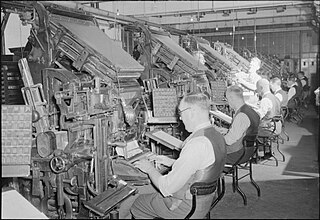
The history of British newspapers begins in the 17th century with the emergence of regular publications covering news and gossip. The relaxation of government censorship in the late 17th century led to a rise in publications, which in turn led to an increase in regulation throughout the 18th century. The Times began publication in 1785 and became the leading newspaper of the early 19th century, before the lifting of taxes on newspapers and technological innovations led to a boom in newspaper publishing in the late 19th century. Mass education and increasing affluence led to new papers such as the Daily Mail emerging at the end of the 19th century, aimed at lower middle-class readers.
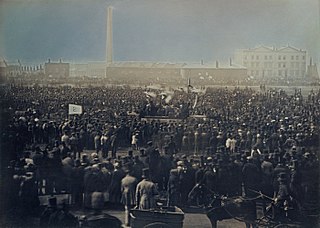
Chartism was a working-class movement for political reform in the United Kingdom that erupted from 1838 to 1857 and was strongest in 1839, 1842 and 1848. It took its name from the People's Charter of 1838 and was a national protest movement, with particular strongholds of support in Northern England, the East Midlands, the Staffordshire Potteries, the Black Country and the South Wales Valleys, where working people depended on single industries and were subject to wild swings in economic activity. Chartism was less strong in places, such as Bristol, that had more diversified economies. The movement was fiercely opposed by government authorities, who finally suppressed it.
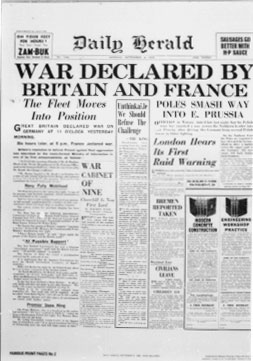
The Daily Herald was a British daily newspaper, published daily in London from 1912 to 1964. It was published in the interest of the labour movement and supported the Labour Party. It underwent several changes of management before ceasing publication in 1964, when it was relaunched as The Sun, in its pre-Murdoch form.
The Birmingham Post is a weekly printed newspaper based in Birmingham, England, with distribution throughout the West Midlands. First published under the name the Birmingham Daily Post in 1857, it has had a succession of distinguished editors and has played an influential role in the life and politics of the city. It is currently owned by Reach plc. In June 2013, it launched a daily tablet edition called Birmingham Post Business Daily. In 2019, the website was scrapped to instead host the nation-wide business news brand Business Live.
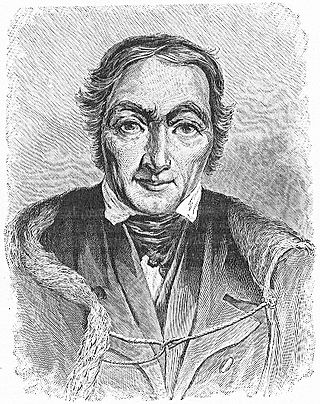
Owenism is the utopian socialist philosophy of 19th-century social reformer Robert Owen and his followers and successors, who are known as Owenites. Owenism aimed for radical reform of society and is considered a forerunner of the cooperative movement. The Owenite movement undertook several experiments in the establishment of utopian communities organized according to communitarian and cooperative principles. One of the best known of these efforts, which was unsuccessful, was the project at New Harmony, Indiana, which started in 1825 and was abandoned by 1827. Owenism is also closely associated with the development of the British trade union movement, and with the spread of the Mechanics' Institute movement.

William Lovett was a British activist and leader of the Chartist political movement. He was one of the leading London-based artisan radicals of his generation.
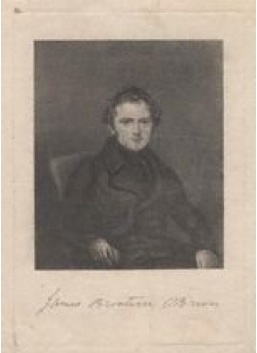
James Bronterre O'Brien was an Irish Chartist leader, reformer and journalist.

Henry Hetherington was an English printer, bookseller, publisher and newspaper proprietor who campaigned for social justice, a free press, universal suffrage and religious freethought. Together with his close associates, William Lovett, John Cleave and James Watson, he was a leading member of numerous co-operative and radical groups, including the Owenite British Association for the Promotion of Co-operative Knowledge, the National Union of the Working Classes and the London Working Men's Association. As proprietor of [[The Poor Man's Guardian|The Poor Man's Guardian]] he played a major role in the "War of the Unstamped" and was imprisoned three times for refusing to pay newspaper stamp duty. He was a leader of the "moral force" wing of the Chartist movement and a supporter of pro-democracy movements in other countries. His name is included on the Reformers' Memorial in Kensal Green Cemetery.

The Northern Star and Leeds General Advertiser was a chartist newspaper published in Britain between 1837 and 1852, and best known for advancing the reform issues articulated by proprietor Feargus O'Connor.
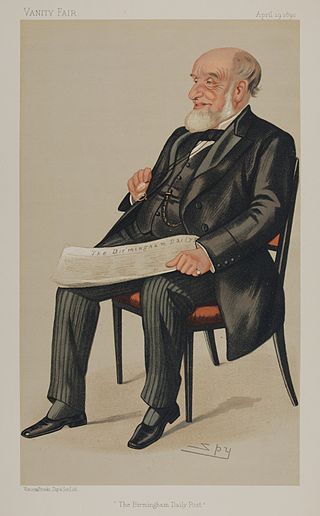
Sir John Jaffray, 1st Baronet was a Scottish journalist and newspaper proprietor.
John Cleave was a British Chartist leader, a printer and newspaper publisher.
The Ayr Advertiser is a weekly Scottish local newspaper, serving the community of South Ayrshire with local news, issues and sports coverage. The Ayr Advertiser was founded in 1803, originally entitled the "Air Advertiser, or, West Country Journal", and claims to be the oldest weekly newspaper in Scotland.
During the nine decades since its establishment in 1919, the Communist Party USA produced or inspired a vast array of newspapers and magazines in at least 25 different languages. This list of the Non-English press of the Communist Party USA provides basic information on each title, along with links to pages dealing with specific publications in greater depth.

For a number of decades after its establishment in August 1901, the Socialist Party of America produced or inspired a vast array of newspapers and magazines in an array different languages. This list of the Non-English press of the Socialist Party of America provides basic information on each title, along with links to pages dealing with specific publications in greater depth.
John Jaffray was a London bookbinder who was active in the early Chartist movement and who assembled a large collection of literature and notes relating to the bookbinding trade. He arrived in London in about 1836. Jaffray was a member of the committee of the London Working Men's Association and a signatory to The People's Charter 1836, an important charter calling for greater political rights for the working classes that presaged the more well known People's Charter of 1838.
The Manchester Gazette was a conformist non-Tory newspaper based in Manchester, England.
James Wroe (1788–1844), was the only editor of the radical reformist newspaper the Manchester Observer, the journalist who named the incident known as the Peterloo massacre, and the writer of pamphlets as a result that brought about the Reform Act 1832.
The history of journalism in the United Kingdom includes the gathering and transmitting of news, spans the growth of technology and trade, marked by the advent of specialised techniques for gathering and disseminating information on a regular basis. In the analysis of historians, it involves the steady increase of the scope of news available to us and the speed with which it is transmitted.

Taxes on knowledge was a slogan defining an extended British campaign against duties and taxes on newspapers, their advertising content, and the paper they were printed on. The paper tax was early identified as an issue: "A tax upon Paper, is a tax upon Knowledge" is a saying attributed to Alexander Adam (1741–1809), a Scottish headmaster.
Samuel Cook lived in Dudley in the 19th century, where he promoted Radical political causes. He agitated for political reform, displaying political posters in the windows of his draper's shop. He became Chairman of the Dudley Political Union, which advocated parliamentary reform, and had a leading role in the Dudley Chartist movement. His political agitation resulted in him being put on trial on many occasions.
References
- 1 2 3 4 5 Whates, Harold (1957). The Birmingham Post, 1857-1957 : a centenary retrospect. Birmingham: Birmingham Post & Mail. OCLC 2671825.
- ↑ Digitised copies of the Birmingham Journal
- 1 2 3 4 5 Upton, Chris (1 December 2007). "Taxing times for city's pioneer newspaper man". Birmingham Post . Birmingham Post & Mail Ltd. Retrieved 5 January 2008.
- ↑ Maccoby, S. (2001). "The People's Charter and the National Petition". English Radicalism. London: Routledge. p. 167. ISBN 0-415-26562-2.
R. K Douglas was making the Birmingham Journal, which he edited, a power not just in Birmingham. One official investigator of 1839 found seventy-one weekly copies in Dunfermline (Parl. Pap., 1839, xlii, 203)